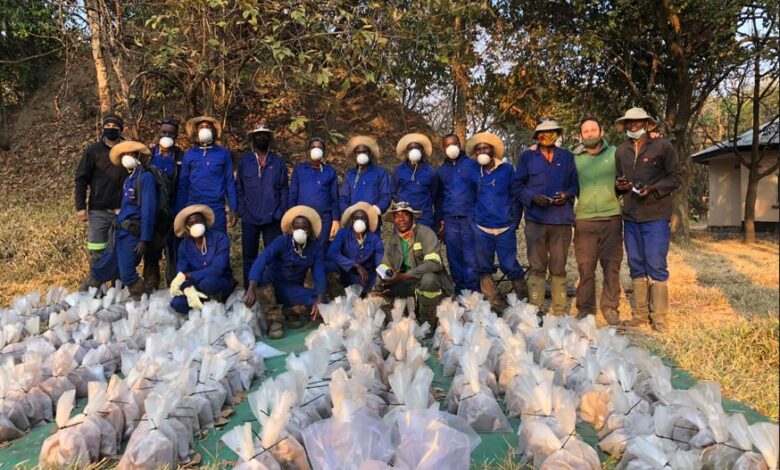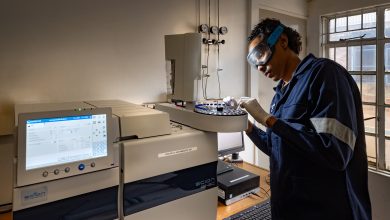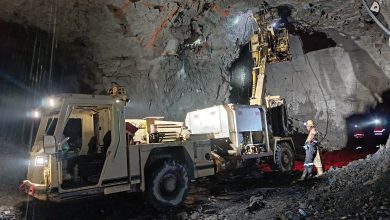
Exploration services and ground geophysical surveys for early and advanced stages
Constant Innovation, Systematic Implementation and Reliable Data
Having battled through a turbulent few years following the Global Financial Crisis and more recently the COVID-19 pandemic, the mineral exploration industry has emerged leaner and stronger. Now, better able to face the challenges of a more connected and more constrained but vibrant sector, the industry offers outstanding opportunities to explorers willing to go the extra mile and do whatever it takes to serve their clients while also authentically serving the ESG (Environmental, Social & Governmental) needs of stakeholders in a sustainable way.
As the industry continues to refocus and realign efforts to better serve clients, the main factors shaping the planning and implementation (analysis, design and execution) of contemporary exploration and ground geophysical surveying projects – both at early and advanced stages – now also include; an increased obligation to comply with Safety, Health, Education and Quality (SHEQ) regulations, the depletion of high-grade ore bearing rock and increasing Operating Costs.
Tracing its roots to early exploration work in the late 1990’s, and being formally established in the early 2000’s, Cape Town-based Remote Exploration Services (RES), a mineral exploration consulting firm, today has a team of 50 committed geoscience professionals, servicing every aspect of the discovery cycle – from defining prospective areas for early-stage exploration through to extending the resource on advanced brownfield projects.
Looking forward to 2022 and beyond, Brett van Coller, Managing Director of RES, provides some insights regarding the current state of mineral exploration in Africa and shares some thoughts about the future of the industry and what it will take to solve some of the complex challenges faced by clients in the African exploration and resource sector.
Readiness to solve complex challenges
“For the past 15 years, we have intentionally gained experience, built expertise and acquired the necessary equipment capable of delivering on the full range of geological and ground geophysical field services along with a high-end technical consulting capability,” Brett van Coller, the Managing Director of RES, underlines the team’s readiness to solve complex industry challenges with its wide pool of talent.
RES’ extensive range of services allows for ongoing value-add and continuity for clients, which, in turn, provides opportunities for its staff to remain involved and customise solutions to their clients’ exploration needs. Fundamentally, RES can provide clients with their own exploration department on an on-demand basis, thus saving them time and money.
Meeting core requirements
Though the impact of COVID-19 on the mineral sector is undeniable, the core requirements and expectations of clients have not changed. On-time delivery, adherence to budgets, uncompromising safety and an unwavering commitment to ensuring the integrity of data. The difference now is that these have to be delivered within the constraints caused by the pandemic.
Delivering on time, within budget and safely
Experience teaches that operating in Africa is full of unexpected challenges making careful planning so much more important to ensure delivery on time, to budget, safely and to the expected quality standards. Consequently, RES has developed comprehensive in-house operational procedures, recorded in its Operations Manual. This document captures the experience gained through many years of tough field work in diverse terrains across Africa which, together with its documented policies and procedures, providing an essential reference tool for successful project management and implementation across the continent.
In addition, van Coller cites the selfless commitment of each member of staff as, undoubtedly, the key factor that ensures RES prevails in unpredictable environments. “Ultimately, we lean heavily on our teams’ commitment to excellence, a strong safety culture and can-do attitude. These three elements ensure that we employ the latest and most appropriate technology on projects, are dedicated to practicing good science, and prioritise safety, while striving to manage logistics seamlessly and maintain administration that is accurate and appropriate”.
Integrity of data
RES greatly values the integrity of data in exploration, and ground geophysical surveying projects is paramount, as it informs vital decisions to be taken regarding the next steps. Recognising this, the team at RES take thorough steps to ensure that the data collected is as accurate as possible, and in accordance with industry best practice, explains van Coller. “As the saying goes, “junk in equals junk out”, so we recognise that exploration success starts at the coalface. Integrity of data is critical and in order to preserve its validity it is essential that a systemic view be taken. For this reason, we place as much importance and value on bagging and tagging of samples out in the field, as we do on a 3D inversion back at the office. Close attention is paid to detail and all client deliverables are reviewed and signed off by a Principal Geoscientist and overseen by the Technical Director.”
RES upholds industry best practice religiously. It strongly encourages peer-to-peer review and fosters a culture of honesty and integrity along with a commitment to do what is right. In its model, management serves the process, and so, business is geared around supporting the work done on-the-ground, out in the field, because the importance of collecting and capturing good quality data starts there.
“Making sure that information is recorded correctly, being diligent with the small tasks out in the field, when it is hot and dusty is where the preservation of data integrity starts. In addition, we have a lot of technical supervision throughout, especially in the field, where we deploy senior technical supervisors to lead field teams and therefore be part of the process every step of the way. Rigorous QA and QC processes are also undertaken on all data, prior to being delivered to clients, with everything being reviewed by Senior Technical Staff,” van Coller explains.
The right attitude and ability of staff
RES values staff as its most valuable asset. For this reason, employment often starts with a 3–6-month (paid) internship at RES. “We acknowledge that everyone, from the newest member of staff through to our longest serving team member, all have a role to play and input to give. Given that many of our team members are away on remote projects for most of the year, its really important that all our staff are problem-solvers who have a ‘can-do’ attitude and are able to work well in a team.
These attributes are best revealed in the field, so the internships often serve as an extended job interview,” Van Coller elaborates.“ We believe success starts with exploration in people and developing a culture where our staff are self-driven and take pride in what they do. This then allows us to go the extra mile necessary to deliver on our clients’ needs.” He adds, “Flexibility is also key. Since every project is unique (terrain, commodity, technical constraints), with differing client needs and expectations, we take care to customise the solution to client requirements.”
Constant innovation
RES appreciates that constant innovation is not an option but a business imperative, given that client expectations in the current exploration environment are continually changing. Accordingly, the consulting firm gives consideration to how best challenges can be overcome with innovation – whether it be the application of existing technologies, testing new technologies or applying old technologies in new ways.
Van Coller emphasises that the company attaches great value to innovation. “Implementation of an appropriate technology specific to our client’s project needs requires effective communication, with a clear understanding of scope and deliverables. The diversity of interests and strengths within our team has allowed us to drive numerous R&D initiatives. We proactively invest in the development and upskilling of our team and look to create an environment where our staff are empowered to take personal responsibility for contributing to what RES can offer.”
Ongoing skills development and training of RES staff, together with investment in the latest technological tools, ensures that team members are competent in a wide scope of work, including: Uranium detection through its proprietary RadonX technology, a world-class kimberlite lab and field pXRF capability, 2D and 3D inversion of geophysical data, drill core scanning capabilities, drone enabled magnetic surveys, a marine diamond mining capability, both remote and on-mine SHEC compliant field operations, a strong grounding in exploration project generation, and an understanding on how to raise money from public markets.
Changes reshaping project implementation
As the saying goes “the only constant is change” and this is also true in mineral exploration where RES has seen important technological innovations, as well as changes in the operating environment, that are shaping the way exploration and geophysical surveys are carried out.
Technology
Significant technology-enabled changes at macro and micro levels that are rewriting how exploration and geophysical surveys are carried out include the development and application of technological innovations such as AI and the use of large datasets, each redefining how information is collected, managed, stored and used.
In addition, increasingly, opportunities are opening up in the use of land cadastre management systems on the continent. “Historically, exploration has been inhibited by concerns regarding the security of land tenure. However, across the continent, more enabling legislative environments for land cadastre management systems are allowing for increased exploration opportunities,” says van Coller, lamenting that South Africa, which should be leading, is unfortunately still trailing behind other Southern African countries such as Namibia, Zambia and Botswana.
Changes in the operating environment
Besides technology, another interesting development is the need for greater transparency in operations, which has meant that clients have tightened up their project operations, requiring more than just geoscientific deliverables and demanding higher levels of compliance, real-time reporting, daily communication and continuous updates. RES views all these as good developments, mainly ushered in by the need for COVID-19 safety precautions, but adding an additional administrative responsibility. “A greater awareness of the need for positive environmental and social stewardship at project locations and generally, as well as more rigorous SHEC compliance requirements, are positive changes that add value that goes beyond just delivering on client expectations,” observes van Coller.
Additionally, there is no question that the travel restrictions imposed by the government in response to COVID-19, together with new international compliance regulations for safe project operations, have had a telling impact on exploration and geophysical projects. These two have certainly added another layer of complexity to what is already a challenging task, but (especially COVID-19) has also provided an opportunity for RES to explore and adopt new approaches.
Perfectly placed for emerging challenges
van Coller states that the RES team is well-positioned to manage the emerging challenges and meet client needs in the exploration and resource industry in 2022 and beyond. “The full extent of the impact of COVID-19 on the exploration and resource industry continues to unfold. This means we need to strategically explore new opportunities and consider how to best position our team, skills and experience to ensure we emerge from this crisis evolved, better adapted and equipped. For RES, it has required the following critical measures to be taken: the establishment of branch companies and remote operational bases, a greater focus on the development of local teams, strategic collaboration with industry experts, an expanded range of ground geophysical techniques, and in-house R&D initiatives to name just a few.
“Fortunately, a positive growth in the market in the form of more active Juniors, and generally more exploration funding available, has provided a broader potential client base which in turn has enabled us to invest in new opportunities and meet the growth in demand. In truth, despite the challenges presented by COVID-19, positive growth in the market has offered opportunities that we may not have been able to take full advantage of had it not been for the pandemic forcing us to re-evaluate and refocus our business”, say van Coller.
Side bar
Operating and Managing a Shallow Diamond Mining Vessel
During a recent project where RES was contracted to manage and operate a shallow water diamond mining vessel on the west coast of South Africa. RES solved the problem on time, within budget and with SHE needs to the client’s expectations.
The concession area had been heavily mined for the last 40 years which meant that new technology and a fresh approach was required in order to unlock any hidden deposits. A further challenge is that suitable weather conditions, that allow for safe diver mining operations, are limited to less than a week a month on average. In addition, strict adherence to SAMSA safety compliance regulations also needed to be considered in project planning and execution.
To manage the challenge, RES put together a good team, collated all available historical data, completed a side-scan survey of the sea bottom, and applied in-house wave refraction modelling to pick target areas for exploration mapping and sampling. Through trial-and-error, the team refined the mining technique and developed a system for effectively moving sand overburden to expose diamond bearing gravel, systematically recording sample site data, which allowed for the effective evaluation of target sites.
Notable milestones were reached, confirms van Coller. “Through the application of good science and hard work we were able to consistently increase monthly diamond production and ultimately turn the operation around from a loss-making exploration venture to a commercially viable mining operation.”
RES’ interventions resulted in a number of benefits to the client, including; the delivery of proof of concept and showing that the mining operation was commercially viable through the development of a sound geological application and robust operations procedures. Furthermore, RES produced a comprehensive Operations Manual, detailing all aspects of the operation, to guide activities and allow for further successful exploration and mining






